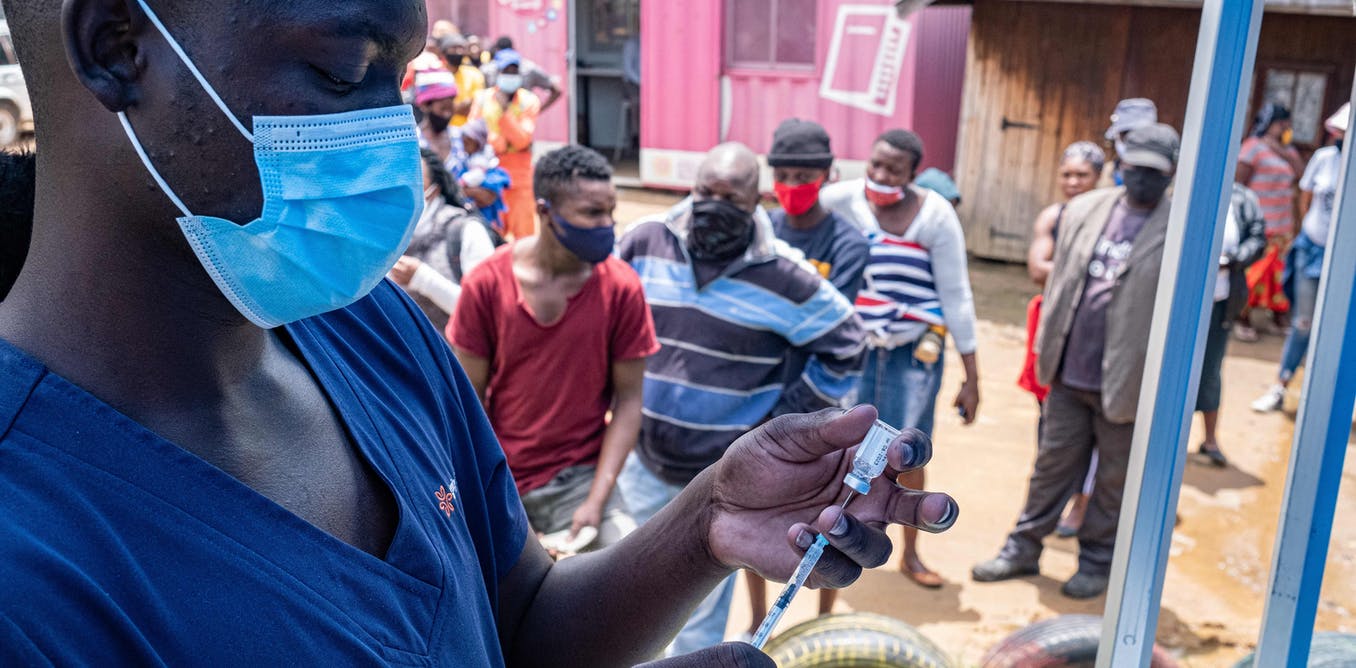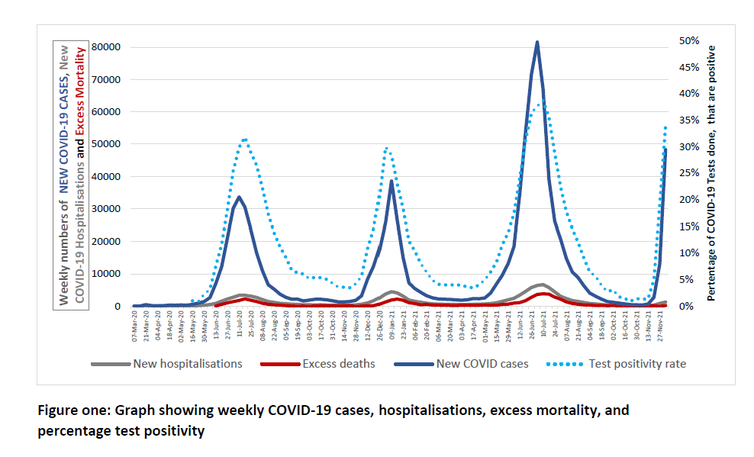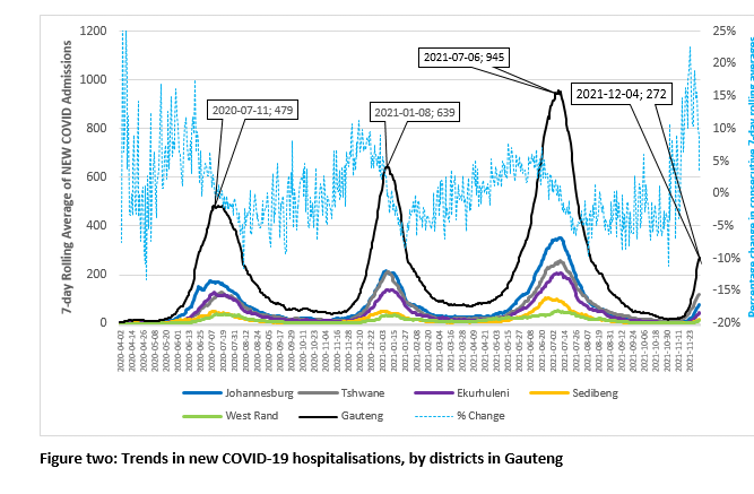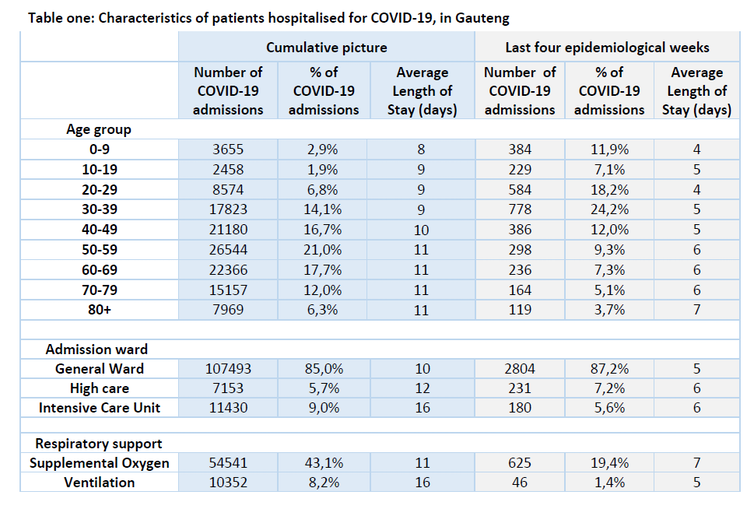South Africa: early data suggest Omicron is more transmissible but less severe

South Africa is reporting a spike in COVID-19 cases. EMMANUEL CROSET/AFP via Getty Images
Gauteng is the smallest of South Africa’s nine provinces but home to a quarter of the country’s population. It is also the country’s economic power house. These factors have contributed to it becoming the epicentre of the COVID-19 epidemic. Gauteng’s COVID-19 surveillance aims to provide an understanding of the province’s experience. This also serves as an early warning system for other parts of the country. Public health medicine specialist Harsha Somaroo is part of the team analysing data for the Gauteng Department of Health and told The Conversation Africa what it’s showing so far.
What’s your data showing about COVID-19 in Gauteng?
In the four epidemiological weeks (13 November to 4 December, 2021), there was an exponential rise in new COVID-19 cases. The province officially entered its fourth COVID-19 wave on 1 December.
During this period South African scientists announced they had identified a new variant of SARS-CoV-2, which the World Health Organisation went on label a variant of concern and named it Omicron. Current data show that the Omicron variant is dominating new COVID-19 cases in the province.
The rate of increase in new cases in Gauteng has been significantly higher compared to any other period in the epidemic in the province. The weekly rates of increase in new infections, when compared to the previous week, were 71%, 341%, 379% and 272%.
That’s reflected by the steep incline in the curve for COVID-19 cases (Figure one).

The COVID-19 test positivity rate (the number of tests done that have a positive result) for the past four weeks, were 1.4%, 5.0%, 19.0%, and 33.9%. This reveals a rapid rise, and now widespread community transmission, of SARS-CoV-2 in Gauteng.
What does your data tell us about Omicron?
The recent exponential rise in new COVID-19 cases, associated with the detection and domination of the Omicron variant in the province, suggests that this SARS-CoV-2 variant of concern is highly transmissible.
It is also possible to understand the severity of illness better by monitoring trends and outcomes among hospitalised patients. There are two sets of data that provide insights – hospitalisations and excess deaths. Excess deaths are deaths above the number expected in a region for that point in time, and give an indication of the COVID-19 related deaths in a region.
Compared with previous periods during which the numbers have spiked the latest numbers show that new daily COVID-19 hospitalisations and excess deaths have been lower than the rate of increase in new COVID-19 cases, suggesting that the variant may cause less severe illness.
The weekly rates of new hospitalisations have been significantly high for the past three weeks (120%; 166%; and 125%). But this was still lower compared to previous periods in which infection numbers rose. Also, the current increase came off a very low base as admission numbers had fallen after the last COVID-19 waves in Gauteng (Figure two).
Another caveat, is that some patients have been admitted for other conditions, and were diagnosed with COVID-19 due to routine testing protocols in hospital, and not because they showed symptoms. Due to the number of patients for which this information is available, this proportion could lie between 7.4% and 52.1% of new COVID-19 admissions.

Another difference the data are showing is that there’s a change in the age profile of admissions. Younger age categories of patients (0-9, 10-19, and 30-39) accounted for higher proportions of hospital admissions during the past month than previously.
A significant proportion of these admissions might be due to asymptomatic COVID-19 infections which were incidental diagnoses due to routine testing for COVID-19 on admission to hospital (between 7% and 46%).
The average length of stay in hospital, for all age categories of patients, was lower in the past month compared to overall. Additionally, fewer patients were admitted into Intensive Care Units (5.6% versus 9%), and a lower proportion of patients required supplemental oxygen therapy (19.4% versus 43.1%) or ventilation (1.4% versus 8.2%) in the past four weeks compared to cumulatively (Table one).
In-hospital mortality rates were also lower in the past four weeks compared to cumulatively (2.6% compared to 22%). However, there was still higher mortality among those over 50 years old.
The early findings suggest less severe COVID-19 infections, though they should be correlated with clinical pictures and monitored closely over the next few weeks to better understand the clinical manifestations and outcomes related to the Omicron variant.

What do people need to do in the light of this information?
These early surveillance findings give us some idea of the transmission dynamics and virulence of the Omicron variant in Gauteng. Trends will need to be monitored closely over the next few weeks to fully understand the impact of this new variant.
The recent high rates of COVID-19 transmission, and continued higher death rates among older patients hospitalised with COVID-19, have important implications for public health measures. The following are critical to decrease the number of new COVID-19 cases:
physical distancing
avoidance of gatherings and poorly ventilated spaces
wearing of masks at all times when around other people
ensuring good hand and respiratory hygiene.
All eligible people, especially those aged over 50, should be fully vaccinated against COVID-19, to protect themselves against severe illness and death. They should also avail themselves for booster shots where indicated.

Harsha Somaroo is affiliated with the Gauteng Department of Health, the University of the Witwatersrand, and the Public Health Association of South Africa.






